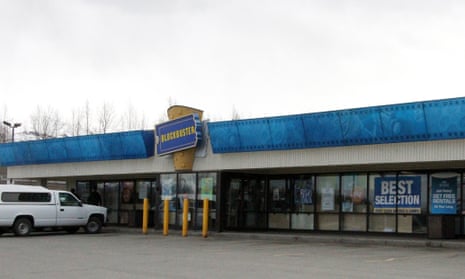Until last week, there were three Blockbuster stores left in the United States; after its two Alaskan branches shut up shop, there is now just one, in Bend, Oregon. It’s an independently owned franchise, so escaped the mass shuttering of its siblings that occurred between 2012 and 2014. The general manager, Sandi Harding, told the New York Times that there were no plans to shut it down in the near future. “We still have that core group of customers that know we’re local, are very loyal and come in every week. Everyone’s tired of sitting at home on their phones and their laptops and not having any personal interactions.”
As a freelance writer, I am familiar with sitting at home on my phone and my laptop not having any personal interactions, but one of the positives of that state is having thousands of films at my fingertips to help pass the down time. (If you have never watched A Bad Moms Christmas at 10am on a Tuesday, then congratulations on your proper job.) The notion of having to travel to a physical shop to rent a DVD or VHS is a distant memory for many, and a completely unfamiliar concept for some. This is an age of convenience and entertainment is on tap. Unless it’s essential that it should be seen on the big screen – as I learned from watching Avatar on a plane – we no longer need to leave the house to bring a film into it.
For the most part, rentals have been replaced by subscriptions, and I wonder how many film buffs would truly, honestly sacrifice this convenience for the nostalgia of a Friday night visit to the video shop. Part of the reason that people hold the memory of video shops so close is because there was no alternative way of seeing films before the internet really kicked in. It’s hard to overplay the importance of having that library of films at a time before it was so easy to see everything. As a young person in the 90s and 00s experiencing murmurings about my sexuality, it was a way of seeing films that made all of that seem far less daunting: But I’m a Cheerleader, in particular, acted as a kind of comfort blanket. I remember getting Kissing Jessica Stein out, and telling my mum it was about dating in New York. “I know what it’s about,” she said, and kindly left it at that. Now, of course, there’s no need to brave taking that tape up to the counter, but then, it was a lifeline.
It’s incredibly easy to reach for a misty-eyed, Stranger Things version of the video shops, then, but they did have their downsides. There were the late fees (folklore has it that Reed Hastings started Netflix after he was stung with a $40 fine for failing to return a VHS copy of Apollo 13), the wait for your turn to take out that shop’s one copy of that year’s big blockbuster must-see release, and, for introverts, the fact that you had to talk to people at all, instead of just quietly clicking on “Critically acclaimed dramas with a strong female lead” category. For a vivid reminder of your worst nightmare video shop assistant, watch the first season of Dawson’s Creek, and hold your streaming subscription tight.
For all of the thwarted Dawson Leerys out there, though, an algorithm really is no match for a human recommendation – I still have some of the promotional posters that the independent video shop in my home town saved for me. (That is, before a chain arrived, and hastened its demise.) Harding might well be right that despite our seeming connectedness, we crave the kind of community that a shop and its staff can offer, particularly when it comes to personal insight and accuracy.
While Netflix, for example, throws every “strong female lead in Hollywood” my direction, it also thinks I might want to watch Horrid Henry Flicks the Bogey again, after I once left my account logged in for my nephew. For film fans, there are sites that combine convenience and curation, particularly when they focus on a niche. Take Mubi, which describes itself as an “online cinematheque” and collects its content by director and by theme, picking a film of the day, providing buff-friendly information around it. It’s no conversation, but it’s an approximation of it.
When we mythologise video shops, perhaps we’re really acknowledging that mass convenience turns the special into the mundane. There was a particular sense of ceremony to the weekly video shop trip, at least in my family. It made movie-watching a treat to be savoured. In much the same way as Spotify’s playlists have turned the experience of listening to music into a scroll through office-friendly playlists of no discernible personality, there is something routine now about choosing which film to watch. It has become a casual weeknight endeavour, rather than a joyful splurge for the end of the week.

